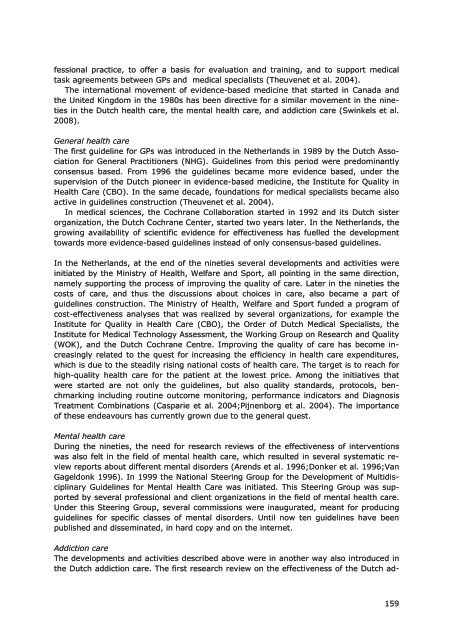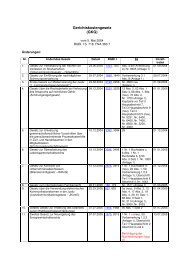The Netherlands Drug Situation 2010 - Trimbos-instituut
The Netherlands Drug Situation 2010 - Trimbos-instituut
The Netherlands Drug Situation 2010 - Trimbos-instituut
Create successful ePaper yourself
Turn your PDF publications into a flip-book with our unique Google optimized e-Paper software.
fessional practice, to offer a basis for evaluation and training, and to support medicaltask agreements between GPs and medical specialists (<strong>The</strong>uvenet et al. 2004).<strong>The</strong> international movement of evidence-based medicine that started in Canada andthe United Kingdom in the 1980s has been directive for a similar movement in the ninetiesin the Dutch health care, the mental health care, and addiction care (Swinkels et al.2008).General health care<strong>The</strong> first guideline for GPs was introduced in the <strong>Netherlands</strong> in 1989 by the Dutch Associationfor General Practitioners (NHG). Guidelines from this period were predominantlyconsensus based. From 1996 the guidelines became more evidence based, under thesupervision of the Dutch pioneer in evidence-based medicine, the Institute for Quality inHealth Care (CBO). In the same decade, foundations for medical specialists became alsoactive in guidelines construction (<strong>The</strong>uvenet et al. 2004).In medical sciences, the Cochrane Collaboration started in 1992 and its Dutch sisterorganization, the Dutch Cochrane Center, started two years later. In the <strong>Netherlands</strong>, thegrowing availability of scientific evidence for effectiveness has fuelled the developmenttowards more evidence-based guidelines instead of only consensus-based guidelines.In the <strong>Netherlands</strong>, at the end of the nineties several developments and activities wereinitiated by the Ministry of Health, Welfare and Sport, all pointing in the same direction,namely supporting the process of improving the quality of care. Later in the nineties thecosts of care, and thus the discussions about choices in care, also became a part ofguidelines construction. <strong>The</strong> Ministry of Health, Welfare and Sport funded a program ofcost-effectiveness analyses that was realized by several organizations, for example theInstitute for Quality in Health Care (CBO), the Order of Dutch Medical Specialists, theInstitute for Medical Technology Assessment, the Working Group on Research and Quality(WOK), and the Dutch Cochrane Centre. Improving the quality of care has become increasinglyrelated to the quest for increasing the efficiency in health care expenditures,which is due to the steadily rising national costs of health care. <strong>The</strong> target is to reach forhigh-quality health care for the patient at the lowest price. Among the initiatives thatwere started are not only the guidelines, but also quality standards, protocols, benchmarkingincluding routine outcome monitoring, performance indicators and DiagnosisTreatment Combinations (Casparie et al. 2004;Pijnenborg et al. 2004). <strong>The</strong> importanceof these endeavours has currently grown due to the general quest.Mental health careDuring the nineties, the need for research reviews of the effectiveness of interventionswas also felt in the field of mental health care, which resulted in several systematic reviewreports about different mental disorders (Arends et al. 1996;Donker et al. 1996;VanGageldonk 1996). In 1999 the National Steering Group for the Development of MultidisciplinaryGuidelines for Mental Health Care was initiated. This Steering Group was supportedby several professional and client organizations in the field of mental health care.Under this Steering Group, several commissions were inaugurated, meant for producingguidelines for specific classes of mental disorders. Until now ten guidelines have beenpublished and disseminated, in hard copy and on the internet.Addiction care<strong>The</strong> developments and activities described above were in another way also introduced inthe Dutch addiction care. <strong>The</strong> first research review on the effectiveness of the Dutch ad-159




